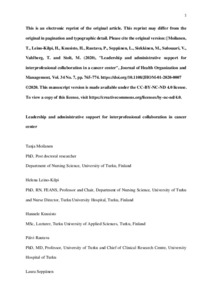Leadership and administrative support for interprofessional collaboration in a cancer center
Moilanen Tanja; Leino-Kilpi Helena; Kuusisto Hannele; Rautava Päivi; Seppänen Laura; Siekkinen Mervi; Sulosaari Virpi; Vahlberg Tero; Stolt Minna
https://urn.fi/URN:NBN:fi-fe2021042821401
Tiivistelmä
Purpose: The interprofessional collaboration is a key practice for providing cancer care. However, the realization of collaboration requires effective leadership and administrative support. In this study, the aim was to analyze healthcare professionals' perceptions of leadership and administrative support (strategic and management) in interprofessional collaboration for developing practices in cancer care.
Design/methodology/approach: A descriptive survey design was used to collect data from healthcare professionals (n = 350, response rate 33.3%), including nurses, physicians and other professionals participating in patient care in one Finnish cancer center (out of five) in 05/2018-10/2018. The data were analyzed using descriptive and inferential statistics. The instrument focused on leadership in the work unit and administrative support including organization strategy and organizational management.
Findings: Healthcare professionals perceived leadership in the work unit, organization strategy and management for the support of interprofessional collaboration as weak. However, the ratings of male respondents and those in leading positions were more positive. The findings indicate that healthcare professionals in the cancer care setting are dissatisfied with the leadership and administrative support.
Research limitations/implications: Interprofessional collaboration, including its leadership, requires systematic and constant evaluation and development.
Originality/value: Healthcare leaders in the cancer care setting can use the results to identify factors that might be in need of attention and development in the field of interprofessional collaboration.
Kokoelmat
- Rinnakkaistallenteet [27094]
